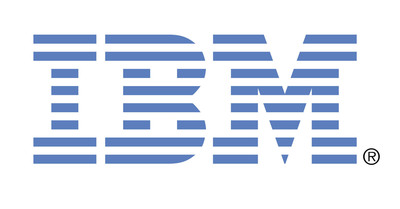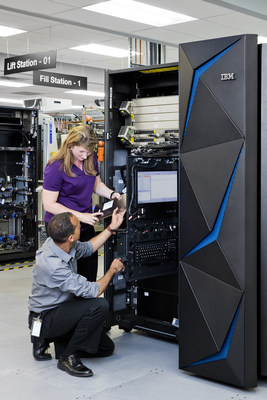 |
ARMONK, New York, July 17, 2017 /PRNewswire/ -- IBM (NYSE: IBM) today unveiled IBM Z, the next generation of the world's most powerful transaction system, capable of running more than 12 billion encrypted transactions per day. The new system also introduces a breakthrough encryption engine that, for the first time, makes it possible to pervasively encrypt data associated with any application, cloud service or database all the time.
Experience the interactive Multichannel News Release here: https://www.multivu.com/players/English/8013251-ibm-z-mainframe-data-protection/
IBM Z's new data encryption capabilities are designed to address the global epidemic of data breaches, a major factor in the $8 trillion cybercrime impact on the global economy by 2022. Of the more than nine billion data records lost or stolen since 2013, only four percent were encrypted, making the vast majority of such data vulnerable to organized cybercrime rings, state actors and employees misusing access to sensitive information.
In the most significant re-positioning of mainframe technology in more than a decade, when the platform embraced Linux and open source software, IBM Z now dramatically expands the protective cryptographic umbrella of the world's most advanced encryption technology and key protection. The system's advanced cryptographic capability now extends across any data, networks, external devices or entire applications – such as the IBM Cloud Blockchain service – with no application changes and no impact on business service level agreements.
"The vast majority of stolen or leaked data today is in the open and easy to use because encryption has been very difficult and expensive to do at scale," said Ross Mauri, General Manager, IBM Z. "We created a data protection engine for the cloud era to have a significant and immediate impact on global data security."
Technology Breakthrough: Industry-First Pervasive Encryption for the Cloud Era
A recent study found that extensive use of encryption is a top factor in reducing the business impact and cost of a data breach. To put that in context, the IBM X-Force Threat Intelligence Index reported that more than four billion records were leaked in 2016 (a 556 percent increase from 2015).
However, encryption is often largely absent in corporate and cloud data centers because current solutions for data encryption in x86 environments can dramatically degrade performance (and thus user experience), and can be too complex and expensive to manage. As a result, only about two percent of corporate data is encrypted today, while more than 80 percent of mobile device data is encrypted [1].
IBM Z pervasive encryption reflects a call to action on data protection articulated by Chief Information Security Officers and data security experts worldwide, and more than 150 IBM clients around the world who participated and provided feedback in IBM Z's system design over three years.
As a result of this collaboration, IBM Z brings significant advances in cryptography technology, building on a proven encryption platform that safeguards the world's banking, healthcare, government and retail systems. IBM Z pervasive encryption delivers breakthroughs including:
"The pervasive encryption that is built into, and is designed to extend beyond, the new IBM Z really makes this the first system with an all-encompassing solution to the security threats and breaches we've been witnessing in the past 24 months," said Peter Rutten, analyst at IDC's Servers and Compute Platforms Group.
Designed for Tough New Data Protection Regulations
The IBM Z also helps clients build trust with consumers and comply with new standards such as the EU's General Data Protection Regulation (GDPR) that will increase data protection requirements for organizations doing business in Europe starting next year. GDPR will require organizations to report data breaches to the regulatory authority within 72 hours and face fines of up to four percent of annual worldwide revenues or 20 million Euro, unless the organization can demonstrate that data was encrypted and the keys were protected. At the U.S. Federal level, the Federal Financial Institutions Examination Council (FFIEC), which includes the five banking regulators, provides guidance on the use of encryption in the financial services industry. Singapore and Hong Kong have published similar guidance. More recently, the New York State Department of Financial Services published requirements regarding encryption in the Cybersecurity Requirements for Financial Services Companies.
IBM Z, deeply integrated with IBM Security software, automates and dramatically streamlines security and compliance processes. For example, auditors are expected to manually inspect and validate the security of databases, applications and systems. Organizations can now immediately demonstrate that data within the scope of compliance is protected and the keys are secure. This can significantly reduce the mounting complexity and cost of compliance for auditors. The system also provides an audit trail showing if and when permissioned insiders accessed data.
Creating the Most Secure Blockchain Service
As blockchain applications become increasingly integrated into core business processes, client's concerns are naturally shifting to security, encryption, and resiliency. The IBM Cloud is constantly evolving with industry leading compute options. Now it is evolving again to bring IBM Z onto the IBM Cloud, launching initially as an encryption engine for cloud services and to run IBM Blockchain services to provide the highest commercially available levels of cryptographic hardware. New blockchain services in centers in Dallas, London, Frankfurt, Sao Paolo, Tokyo and Toronto are secured using IBM Z's industry-leading cryptography technology.
"The powerful combination of IBM Z encryption and secure containers differentiates IBM Blockchain services on the cloud by supporting the trust models new blockchain networks require," said Marie Wieck, general manager, IBM Blockchain. "Enterprise clients also benefit from the ease of use making management transparent to the application and the user."
AngelHack, in collaboration with IBM, today launched "Unchain the Frame," a global virtual hackathon with more than $50,000 USD in prizes. Developers from around the world are invited to show off their skills and creativity using technologies such as blockchain, open source applications, financial industry APIs and machine learning on IBM Z.
New: Predictable and Transparent Container Pricing
IBM also announced three groundbreaking new Container Pricing models for IBM Z, providing clients greatly simplified software pricing that combines flexible deployment with competitive economics vs. public clouds and on-premises x86 environments:
These precedent-setting Container Pricing options are designed to give clients the predictability and transparency they require for their business. The pricing models are scalable both within and across logical partitions (LPARs) and deliver greatly enhanced metering, capping and billing capabilities. Container Pricing for IBM Z is planned to be available by year-end 2017 and enabled in z/OS V2.2 and z/OS V2.3.
The Most Powerful Transaction System for the Cloud Era
IBM Z builds on the capabilities of the world's most powerful transaction engine at the center of global commerce today supporting:
Banks and others in the financial services industry process thousands of transactions per second to keep the world's financial systems running. The mainframe is more critical than ever for reliably handling high volumes of transaction data.
Ninety-two of the world's top 100 banks rely on the IBM mainframe because of its ability to efficiently process huge volumes of transactions. To help financial services organizations more effectively compete in the cloud era, enormous amounts of sensitive data produced by transactions can now be better protected against fraud and cybercrime, analyzed, and monetized using IBM Z – without causing disruption of day-to-day operations. For banks, this means encryption at the click of a button -- even while applications are running -- and the ability to migrate data from unencrypted to encrypted with no impact to service level agreements.
The IBM Z, the next generation of IBM's industry-leading CMOS mainframe technology, features the industry's fastest microprocessor, running at 5.2GHz, and a new scalable system structure that delivers up to a 35 percent capacity increase for traditional workloads and a up to a 35 percent capacity increase for Linux workloads compared to the previous generation z13. The system can support:
Other new available capabilities announced today include:
As part of today's announcement, IBM also previewed new z/OS software that provides foundational capabilities for private cloud service delivery, enabling a transformation from an IT cost center to a value-generating service provider. When available, these capabilities will include the support of workflow extensions for IBM Cloud Provisioning and Management for z/OS and real-time SMF analytics infrastructure support.
IBM Global Financing can help credit-qualified clients acquire the new IBM Z, lower their total cost of ownership, and accelerate return on investment. IBM Global Financing offerings for IBM mainframe solutions are available from IBM and IBM Business Partners, and provide flexible terms and conditions that can be customized to align cost to project benefits or other client needs.
Learn more about the IBM Z portfolio , the new IBM z14 mainframe or IBM Z enterprise security .
IBM Global Financing offerings are provided through IBM subsidiaries and divisions worldwide to qualified commercial and government clients. Rates and availability are based on a client's credit rating, financing terms, offering type, equipment and product type and options, and may vary by country. Non-hardware items must be one-time, non-recurring charges and are financed by means of loans. Other restrictions may apply. Rates and offerings are subject to change, extension or withdrawal without notice and may not be available in all countries. IBM and IBM Global Financing do not, nor intend to, offer or provide accounting, tax or legal advice to clients. Clients should consult with their own financial, tax and legal advisors. Any tax or accounting treatment decisions made by or on behalf of the client are the sole responsibility of the client.
IBM, the IBM logo, ibm.com, IBM Z and z14 are trademarks of International Business Machines Corporation, registered in many jurisdictions worldwide. Other product and service names might be trademarks of IBM or other companies. For a current list of IBM trademarks, please see http://www.ibm.com/legal/copytrade.shtml
All other company, product or service names may be trademarks or registered trademarks of others. Statements concerning IBM's future development plans and schedules are made for planning purposes only, and are subject to change or withdrawal without notice. Reseller prices may vary.

Photo - http://mma.prnewswire.com/media/536101/IBM_Meet_the_New_Z.jpg
Logo - http://photos.prnewswire.com/prnh/20090416/IBMLOGO